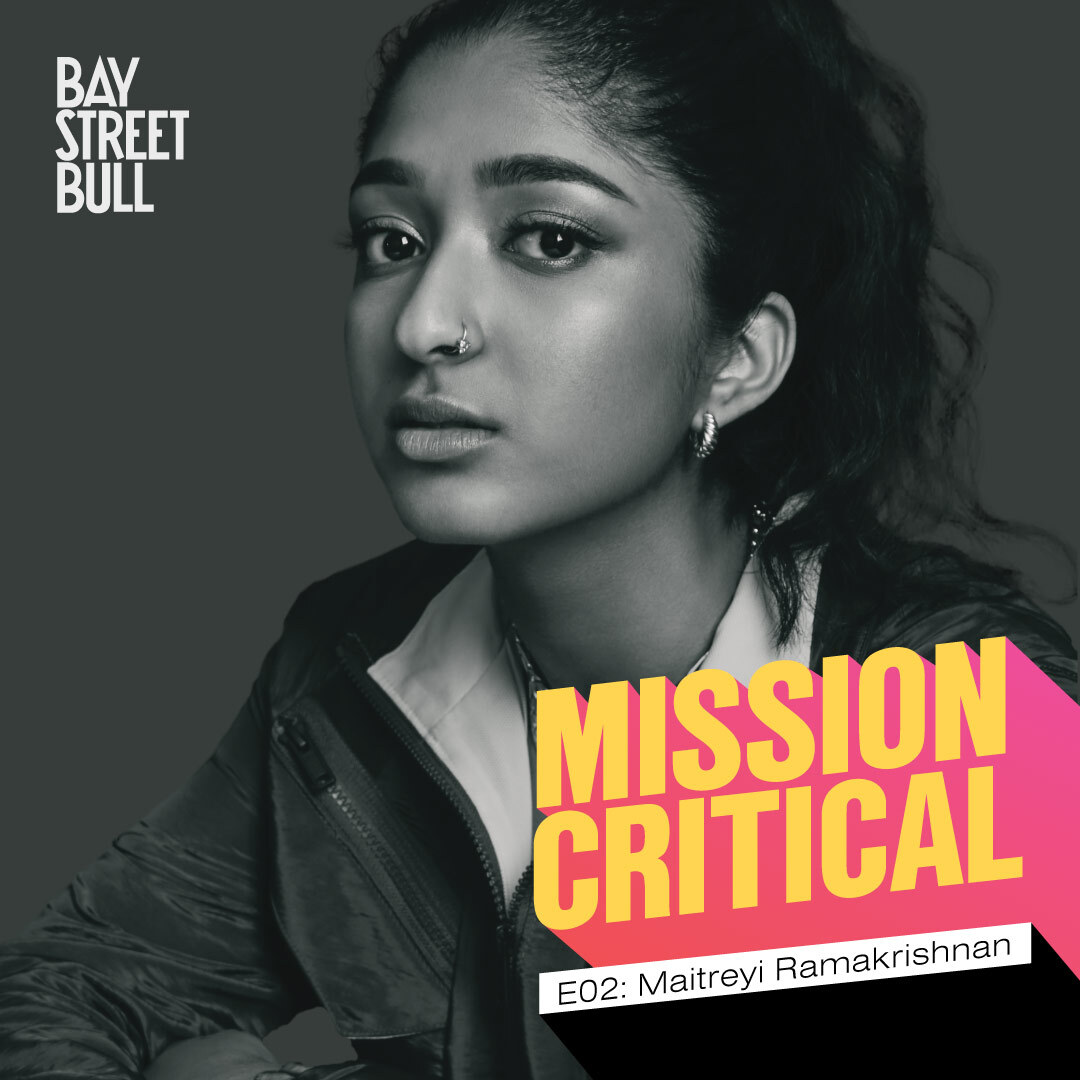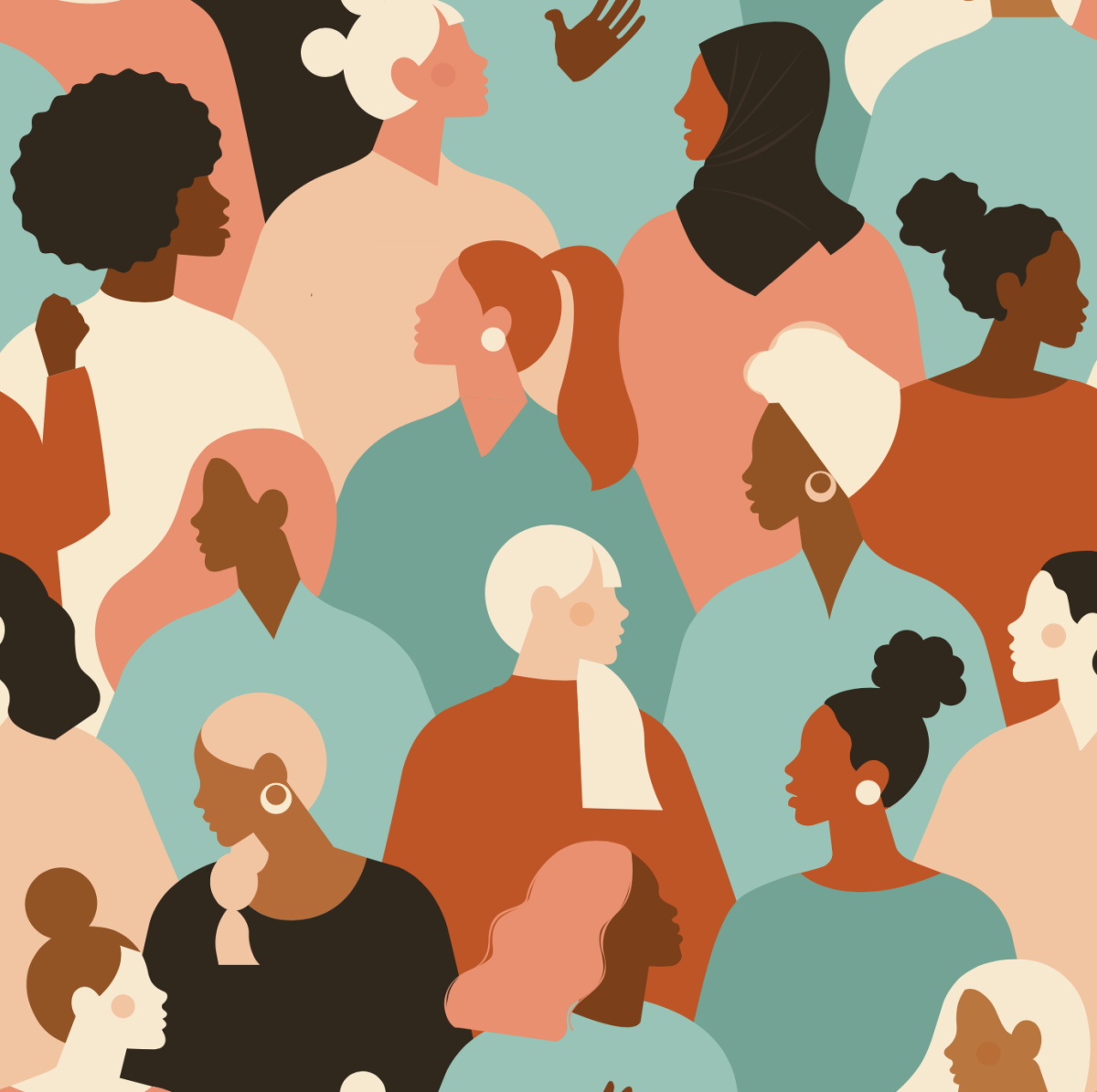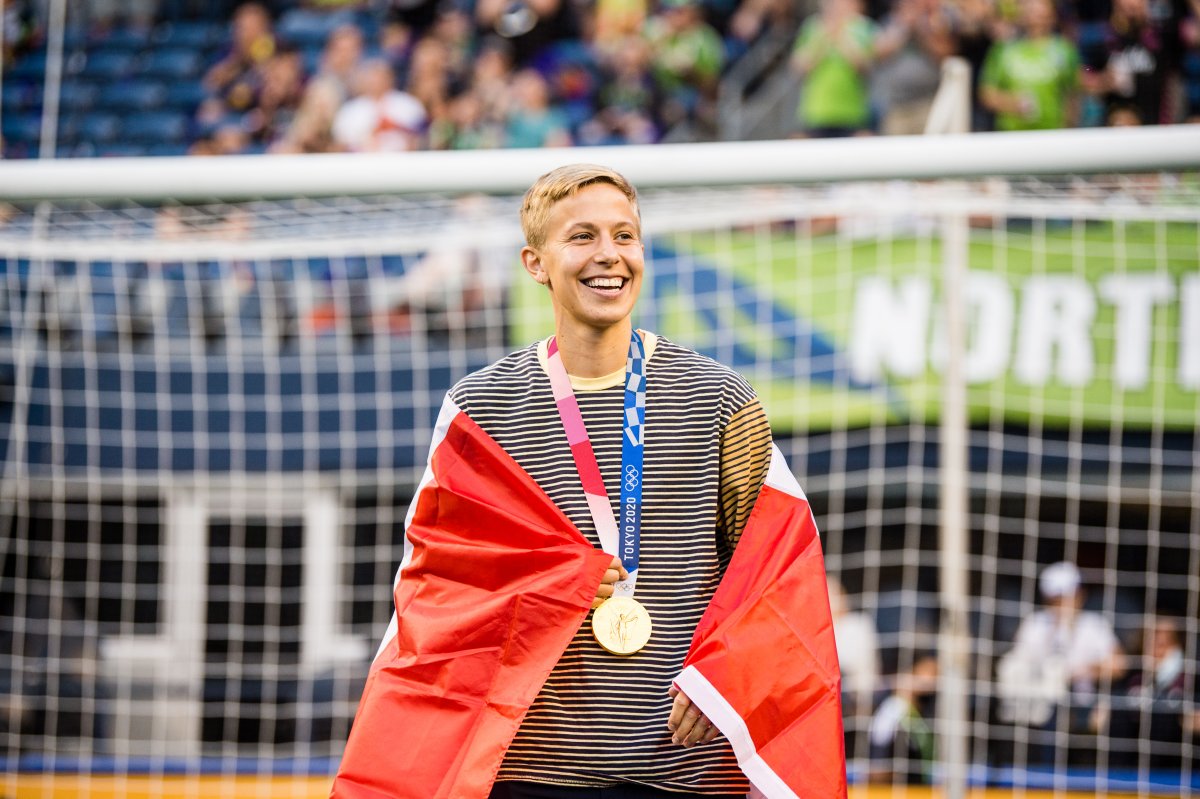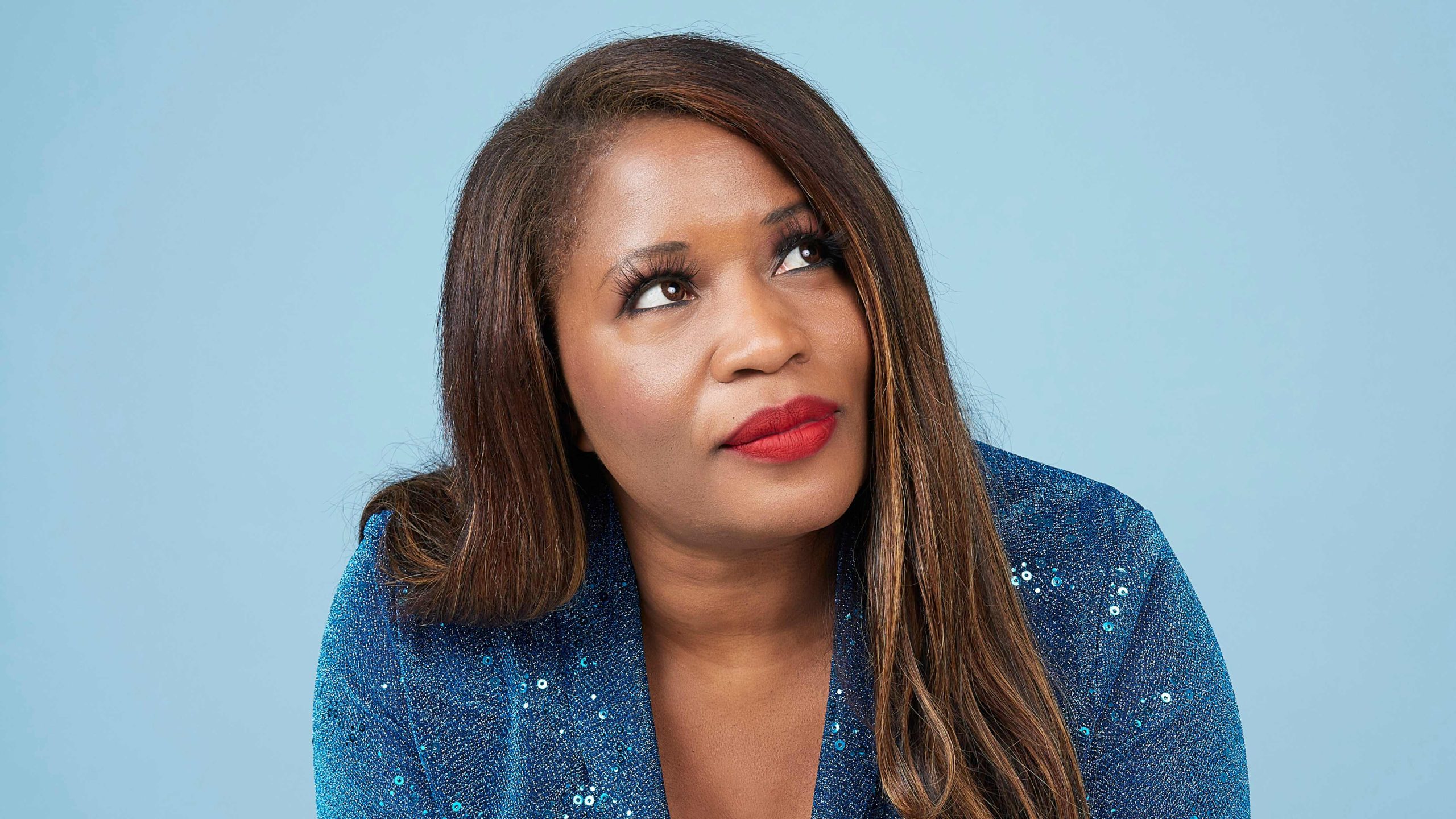Mississauga-born Maitreyi Ramakrishnan beat out 15,000 other girls when she landed the lead role of the Netflix original series Never Have I Ever, a groundbreaking show that tells a coming-of-age story focusing on family dynamics, relationships, grief, and friendship through the lens of an Indian-American household. In this episode, Maitreyi chats with Lance about representation, identity, and leadership. Also, what’s Mindy Kaling like as a boss?
KEY HIGHLIGHTS
[3:14] What has the reaction been like after launching a groundbreaking show like Never Have I Ever? What kind of feedback has the community provided? TLDR: People have been starved for representation.
[5:54] What’s Mindy Kaling like as a boss? “ It’s like Regina George waved us down, but make Regina George nice and not vicious. Like, that’s what it was.”
[14:18] Maitreyi’s first experience seeing a South Asian character on TV was less than impressive. “I remember being let down, and I was just a kid. I remember being like, Okay, Hermione, anyways, like what’s up girl?”
[17:37] Maitreyi’s vision for her character Devi was to create an unapologetic South Asian character that was bold, smart, and shunned the sidekick narrative.
[18:51] What does it mean to embrace your cultural identity? Is there a checklist that certifies you as a gold standard Tamil?
[21:05] Your identity is something that grows with you. It changes and evolves as you progress through life. As such, it’s important to check up on yourself every so often and reflect.
[22:34] If you have power, use it well. For Maitreyi, this means embracing the responsibility to represent her community in the roles that she takes on.
Listen to the episode below or your platform (Apple, Spotify, etc.) of choice.
INTERVIEW
[INTRO]
“I try not to dwell on that, though, the fact that I didn’t get this representation when I was younger, but the fact that my little cousin—she will.”
Welcome to Mission Critical, a podcast about the big picture, the purpose, and the values that drive today’s most game-changing companies, entrepreneurs, and leaders. I’m your host Lance Chung, Editor-in-Chief of Bay Street Bull, and I’ll be introducing you to a group of brilliant minds who are making an impact on the world and forging the path ahead. While they may all be very different from one another, the question remains the same—what’s your mission?
Once in a lifetime opportunities are just that—opportunities so rare, you’re lucky if you ever get the chance to come across them. So what happens if you find yourself fortunate enough to come face to face with one? In Maitreyi Ramakrishnan’s case, you don’t change a thing.
Maitreyi got the role of a lifetime by being her authentic self. Born in Mississauga, Ontario, she was handpicked to lead Mindy Kaling’s coming-of-age series Never Have I Ever.
Now, beating out 15,000 other people for your very first role in a major Netflix production would be impressive enough, but the real impact here is the ripple that the show and its team have sent out into the world. Never Have I Ever is a typical coming-of-age story about a teenager navigating the ups and downs of life. What’s not so typical is that it’s a mainstream show that discusses family dynamics, relationships, grief, and friendship through the lens of an Indian-American household.
Earlier this year, Never Have I Ever debuted to the tune of 40 million households—that’s over 40 million people who watched a show featuring a majority South Asian lead cast and narrative, and countless South Asians who saw themselves represented in a major Netflix production.It’s something that is bigger than the sum of its parts.
Plucked out of thin air, Maitreyi’s journey is both inspiring and indicative of a change that’s happening. For her, this is just the beginning and an opportunity to not only make her mark on Hollywood, but also join a new wave of talent that is redefining the industry and the stories that are being told.
Lance Chung: It’ so great to be speaking with you. I’ve been watching your journey, literally, I guess, on the screen and it’s been a joy to see Canadian talent being celebrated the way that it is with you and your show. What’s that journey been like since the show debuted?
Maitreyi Ramakrishnan: It’s been interesting because it’s all in quarantine. So there’s this weird, surreal feeling about all of it. But at the same time, it’s also like, Whoa, Oh my God. People know my face. This is crazy.
Lance Chung: Right, of course. And so Never Have I Ever is your very first project. Coming off of the first season, how has the reaction been like for you? What kind of feedback have you gotten from the community? Obviously it’s a very symbolic and significant kind of show of its kind, too.
Maitreyi Ramakrishnan: Yeah, there’s been a lot of really good feedback. Just the other day when I was walking with my friends out in a park, somebody just came up and said, Thank you so much for the show. It just means so much to me for what you do. And I realize a lot of people really were starved for this representation and they’re so appreciative of it. So there’s a sadness to it because it’s been so long for them to wait to get this representation, but I’m glad it finally has come. It shows how much work we still have yet to do.
Lance Chung: Now when the show came out, my partner and I watched it, and what I love about this show is that it has this beautiful message of self discovery that doesn’t apply to only teenagers, but to a wide audience of adults as well. And you know, also the fact that that path to discovering your potential is not always a straightforward path. It can be messy and winding and complicated in order to get to where you need to go. What did you discover about yourself while you were playing your character?
Maitreyi Ramakrishnan: I realized, personally, how normalized I made it for myself to not see somebody like me on TV because I always knew there weren’t many South Asian characters on TV that I could dress up for like a Halloween costume, right? They’re all usually white characters. But I realized after the show came out and after of course playing Devi how little there is, and how much of an effect that has had on me now. I really wish there was more when I was growing up. I try not to dwell on that, though, the fact that I didn’t get this representation when I was younger, but the fact that my little cousin, she will, and I think that’s awesome.
Lance Chung: I mean, it is crazy when you think about it, something like choosing a character to dress up for Halloween, which that may not even land on someone’s radar, but for people who are of minority communities, how much of an impact that has on you at such a young age and how that carries with you as you grow up.
So, you were handpicked by Mindy Kaling and it was an open audition. You auditioned with your friend. And I know that you’ve already kind of covered a lot of that with the interviews that you’ve done in the past so I want to talk more about one, your experience with working with her, and also really about the significance and representation and the impact that the show has and your character. So maybe we can start off with, you were handpicked by Mindy Kaling. What was it like working with her and how was she as a boss?
Maitreyi Ramakrishnan: She’s amazing. Like, I’m so blessed to say that she’s my first boss. That’s so wild to me still, but she’s truly amazing and is such a pleasure to work with. Never once did I feel like I couldn’t ask her a question or I couldn’t approach her. Of course, she’s this big celebrity with so much talent and so many skills that has so much to offer, but I never felt intimidated that I couldn’t ask her a question or I couldn’t ask her for help.
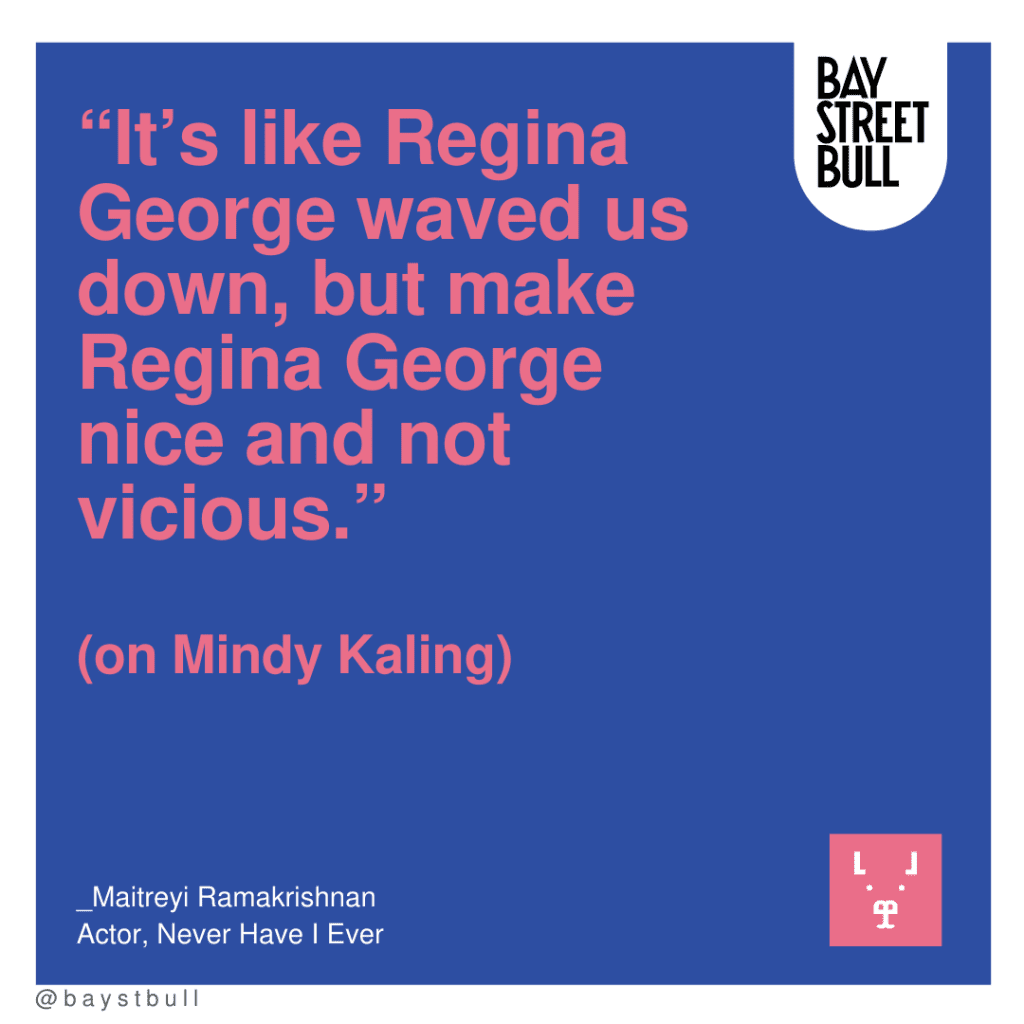

Maitreyi Ramakrishnan: I think one really good memory that I had was during one lunch while we were filming at the high school up in the Valley in LA. Me and my co-star Jaren Lewison, who plays Ben, we’re just going through the food line, we’re getting our food and whatnot, and we look a little lost. Like we don’t know where to go because it’s the first time we’re filming at the school. And then Mindy and, you know—she’s sitting with a couple of her writers and her assistant—she waves us over and she’s like, “Guys, come eat with us!” It’s like the cliché kind of scene you would see in a high school TV show. It’s like Regina George waved us down, but make Regina George nice and not vicious. Like, that’s what it was. So, that was a really good memory.
Lance Chung: Amazing. And what have you learned about great leadership from her? Because obviously everyone in the world knows her as a great actor and a producer, but you’ve had this firsthand experience working with her and really seeing how she steers a ship. What have you learned about what it takes to be a great boss, a great leader, and to lead a team and see a project through?
Maitreyi Ramakrishnan: One thing I realized whenever Mindy walks on set, everybody just has so much respect for her because she truly respects and values the opinions of everybody. She doesn’t shut down anybody and she truly takes the time to know everybody’s name and tries her best to meet everyone and talk to everybody. And that respect is clearly shown whenever she comes on set. Everybody loves and adores Mindy. And like I said before, there’s never this idea with anybody that they can’t talk to her or they can’t approach her. I think that really speaks to how she runs her set in general. The whole environment while filming is really nice and welcoming so that everybody can talk to everybody. I’m really blessed to say that was my first onset experience and I think that really affects the team that she leads.
Lance Chung: Right, it trickles throughout the organization. Because this is your first big role, was there anything that surprised you about your experience going into the project that you were pleasantly surprised to find out as you progressed throughout this show and the season and your first Hollywood experience, I guess?
Maitreyi Ramakrishnan: I’ve always been fascinated with film and how it’s created. And I knew it took a bunch of people to make a show, make a movie, but I did not realize it would be that many people. Like there’s a job for everything. There’s a guy who just maintains the trees, like the fake trees. So I think that’s wild.
Lance Chung: I read that one piece of advice that she gave you was to be yourself. What does that mean to you to be your authentic self?
Maitreyi Ramakrishnan: It’s definitely all about just being myself versus what I see out there with other celebrities and other stars, and not trying to emulate what they’re doing because that’s “the right thing to do” when you’re a young star. I’ve made it this far being myself so I should just stick to what I know rather than just trying to be somebody else, because that’s really not living for myself either.
Lance Chung: Now, Never Have I Ever explores this wonderful family dynamic, a generational family dynamic. As someone who was born in Canada, are there any cultural or generational differences between your parents and yourself that you struggled to come to terms with or relate to growing up?
Maitreyi Ramakrishnan: I never really had any stark cultural differences while growing up that really affected me, but one thing definitely was the idea of not knowing my culture because I go to school and there’s so many different cultures and so many people from different backgrounds that you sort of can get lost in the sauce. Being Tamil, it’s very, you know, unique in the sense that there’s a lot of history and a lot of complications of what that means. So I think that has been the journey for me; figuring out what being Tamil means to me and identifying how I feel is the right way for me.
Lance Chung: You were born in Canada, but your family came to Canada as refugees from Sri Lanka. Did that have an impact in shaping your worldview growing up and as an artist?
Maitreyi Ramakrishnan: I don’t think so necessarily because I feel that that’s my parents’ journey being refugees, that’s their story. All that came with that is their story while mine is being born and raised in Canada. I think what has helped me as an artist and actually more just as a person is growing up alongside so many of my friends from all different backgrounds. That exposure being able to talk to anybody and just being informed of other cultures. I think that’s a really beautiful thing.
Lance Chung: The beautiful thing about growing up in Canada—I was also born in Canada and my parents are from South Korea—we have our own share of problems here for sure. But I think one of the big things that is so beautiful is that our identity is really built in the fact that we have so many identities and that all contributes to a bigger picture around diversity and inclusion. Definitely there are a lot of problems that we need to still address, and we’re not a perfect society by any means, but in my experience, growing up and in high school too, I did feel that I was different in a lot of ways because of my background, but at the same time, at least I knew that I wasn’t alone and that there were a lot of people that surrounded me and also shared in that experience too.
Maitreyi Ramakrishnan: It’s that feeling of being unique, but you’re not alone.
Lance Chung: Exactly, and there’s a comradery that kind of results out of that experience.
So, when the show came out, did you watch it with your family first or did you watch it by yourself? How did you celebrate that and how did you share that experience with your family and your friends?
Maitreyi Ramakrishnan: Yeah, so I didn’t get to watch it with my friends. We did watch it together over a Netflix party, but there’s only so many times I was going to watch the show over and over again. I wasn’t watching the show a bunch of times over. I was going to get annoyed with seeing my face, but I did watch it first with my family, meaning my mom, my dad, my brother, my grandma, and myself. And it was a fun experience. My mom and my dad, they knew the plot because they were on set with me. So there wasn’t much of a surprise, but my grandma’s reactions were super funny. My grandma, my brother constantly have a battle of team Ben and team Paxton. It’s quite an event.
Lance Chung: Right. They’re hedging their bets against each other. How special was that to share that experience? I assume then, your family was with you on set. Have they always been supportive of you pursuing a career in the arts? Because I know that in Asian communities, in South Asian communities, there is kind of this expectation, I guess, sometimes [that] the parents have on their kids to pursue being doctors or lawyers or whatever it might be.
Maitreyi Ramakrishnan: Oh yeah, 100 percent. Because when I was younger, my mom put me in piano lessons, which I did all throughout my life up until the end of high school. I did ballet for a year, did not like that though. But back when I was younger, I wanted to be an animator. So my mom and my dad, they would always give me whatever art supplies that I needed. And they always really said, as long as you do the best job that you possibly can to get the dream job you want, that’s what matters. do whatever you want, but do the best job
Lance Chung: Growing up, what was your first experience like seeing a South Asian character on TV in North America or someone that you could identify with, someone like you. What kind of impact did that have on you and how you want to shape your career?
Maitreyi Ramakrishnan: I remember, the first time I saw a South Asian character on screen film-wise I guess would be the Patel twins from Harry Potter. And I remember being let down, and I was just a kid. I remember being like, Okay, Hermione, anyways, like what’s up girl? Like, how are you doing? Because I was like, what is this? These Brown girls are just simping over Harry and Ron. That’s it? This is all they get? So that was my first impression, but when it came to Devi, when I was portraying her, the biggest thing I always had in my head was just [to] make a real character because you can’t possibly make a character that everybody will relate to because then you’ll have just a ball of fluff. As long as I stay true to what I know as the experience of high school, but of course also Mindy’s experience growing up because it is loosely based off of her life, that will make a proper character with flaws and in that self, it’ll be realistic with depth.
Lance Chung: Building on what you said, it’s not about trying to make everyone happy. I think it’s more important to be something to someone than nothing to everyone, right? And that’s really important. I think that’s sometimes when you try to make everyone happy, you just end up making no one happy, including yourself.
[INTERLUDE]
Representation in media is not a new topic. Campaigns and initiatives to tell more stories featuring diverse characters have been an ongoing battle for years. Yes, we need more people of colour, more female leads, more LGBTQ+ characters —more diversity—represented in the media that we consume. But it’s a complicated and layered conversation. Inserting a person of colour into a lead role, for example, is not enough to say the work has been done. After all, individual characters and actors are not monoliths or representative of their entire communities. For Maitreyi, it’s not just about visibility, but also individuality. It’s about acknowledging that there are entire spectrums of experiences within communities that are not being represented, and that it’s not up to one person or even a handful of characters to tell all these stories. That’s why she appreciated her character, Devi—a bold and confident character that unapologetically shuns the sidekick narrative that is often associated with POC characters. Devi is an individual that exists in many communities that intersect with each other. She is one story in a sea of many that need to be told.
Lance Chung: This show is groundbreaking because it features intersectional South Asian female characters that are not the sidekick, or apologetic, or kind of all of these character traits that have typically been associated with characters in mainstream media. How much of a conscious decision was this in how you portrayed Devi or how did it inform the way you want it to shape her and build her and introduce her to the world?
Maitreyi Ramakrishnan: One thing I really love about Devi is how she’s not a sidekick, but she’s also unapologetic. She’s a smart character. She’s a very smart girl. In that way you can tread on the stereotype of like, Oh, all South Asians are nerds. But I don’t think that’s a bad stereotype, but what I like about Devi is that, yeah, she’s a nerd, but she’s not embarrassed about it. She knows she’s smart, and she’s damn proud that she’s smart. She’ll definitely flex her intelligence on you. So in those ways of Devi’s confidence about her intelligence and just her spunk and sass, I think those parts are really nice in order to make a character that’s bold and not the sidekick. It demands attention. Devi really does demand attention, honestly sometimes too much but she holds the crowd and she owns the room, which I think is really awesome.
Lance Chung: And there’s a complexity and layers to her character, I guess. She could be one thing, but it doesn’t mean that it’s mutually exclusive from being another thing too.
Now I know you mentioned being Tamil and Canadian, and we briefly touched on this, but did you ever feel like you had to grapple with embracing both identities growing up?
Maitreyi Ramakrishnan: Yeah, because I remember when I was younger, other classmates of mine, they would go for Bharatanatyam dance lessons, or keyboard lessons, and Tamil school. But I never really did any of that. My interests were just in other places. Like I would want to do Scouts. I loved Scouts as a kid and I loved doing piano instead. I remember in my head having this idea that there’s a checklist to be Tamil. Like you have to play this instrument, speak the language, do Bharatanatyam, and then be able to dance. But I wasn’t checking those boxes. So I felt like, Oh, I’m just not as Tamil. That’s how I felt when I was younger and that really sucked. But now I’m like, no screw that. Being Tamil is so much more than just a checklist and it is a shame for somebody to think that it is merely just a checklist, but that’s on them. I know in my heart that that’s not the case and being Tamil is whatever that means to me as an individual, as it would mean to somebody else.
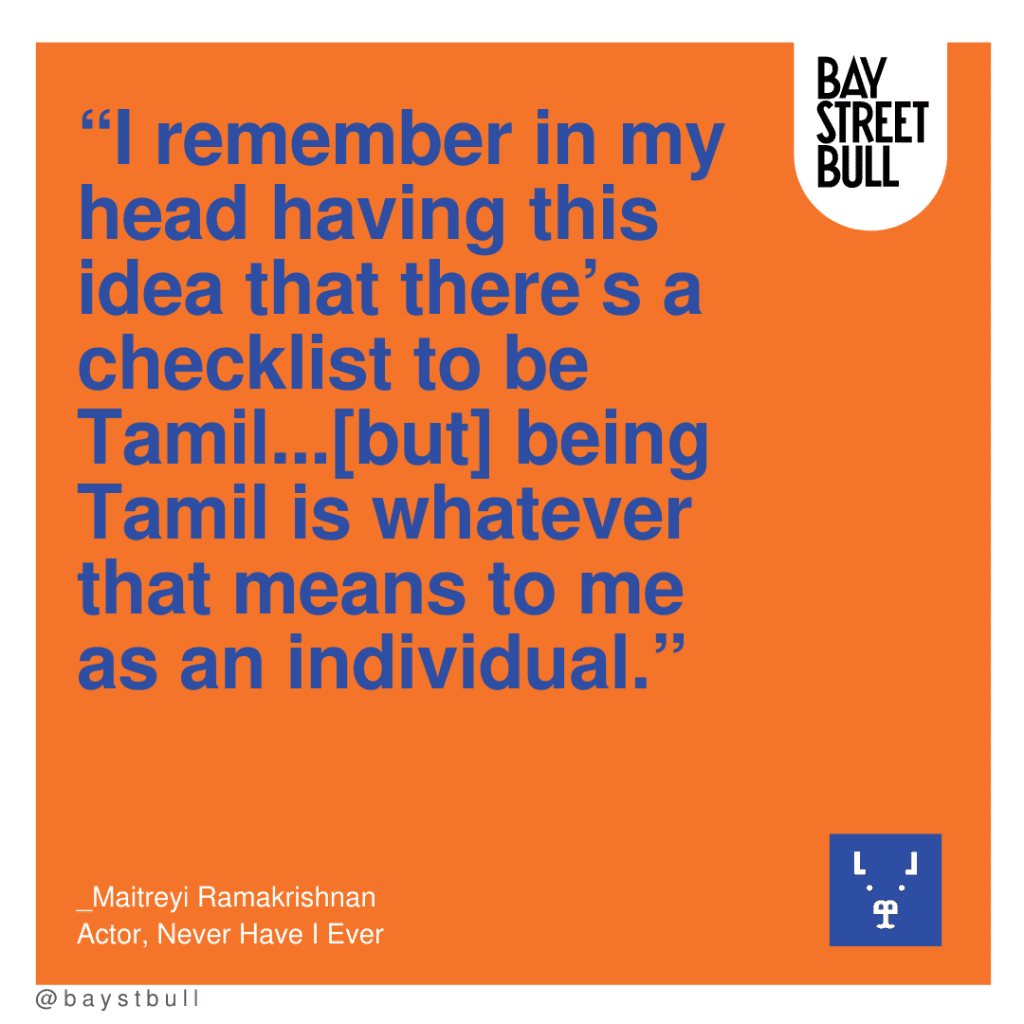

Maitreyi Ramakrishnan: I like to think that I’ve always known who I am, but I also feel like there definitely have been times where I’m like, Who am I? I don’t know who I am. And I think that’s just human you know? And I think anybody would be lying to you if they said that they always knew who they are throughout their whole life, because that’s impossible. Your identity is constantly changing as you go through life, and it’s not just a one-check and done. It’s a constant checkup. It’s like going to the doctors every so often, you know? You’ve got to do a checkup because it can change up and that is cool. You’re ever-evolving.
Lance Chung: And how do you check in on yourself? What are those moments where you are able to take a pause and reflect on yourself and where you’re at?
Maitreyi Ramakrishnan: I just stare at the mirror and I say, Sup? No, I don’t know. It’s just, you know, those moments of reflection, I guess, when you’re faced with some sort of challenge that makes you wonder, Hey, how do I feel about this? And what is my stance on this? It’s like those constant questions that you’ve got to ask yourself, that self-reflection. I feel like that’s just something I also do as an overthinker. Like I constantly am overthinking.
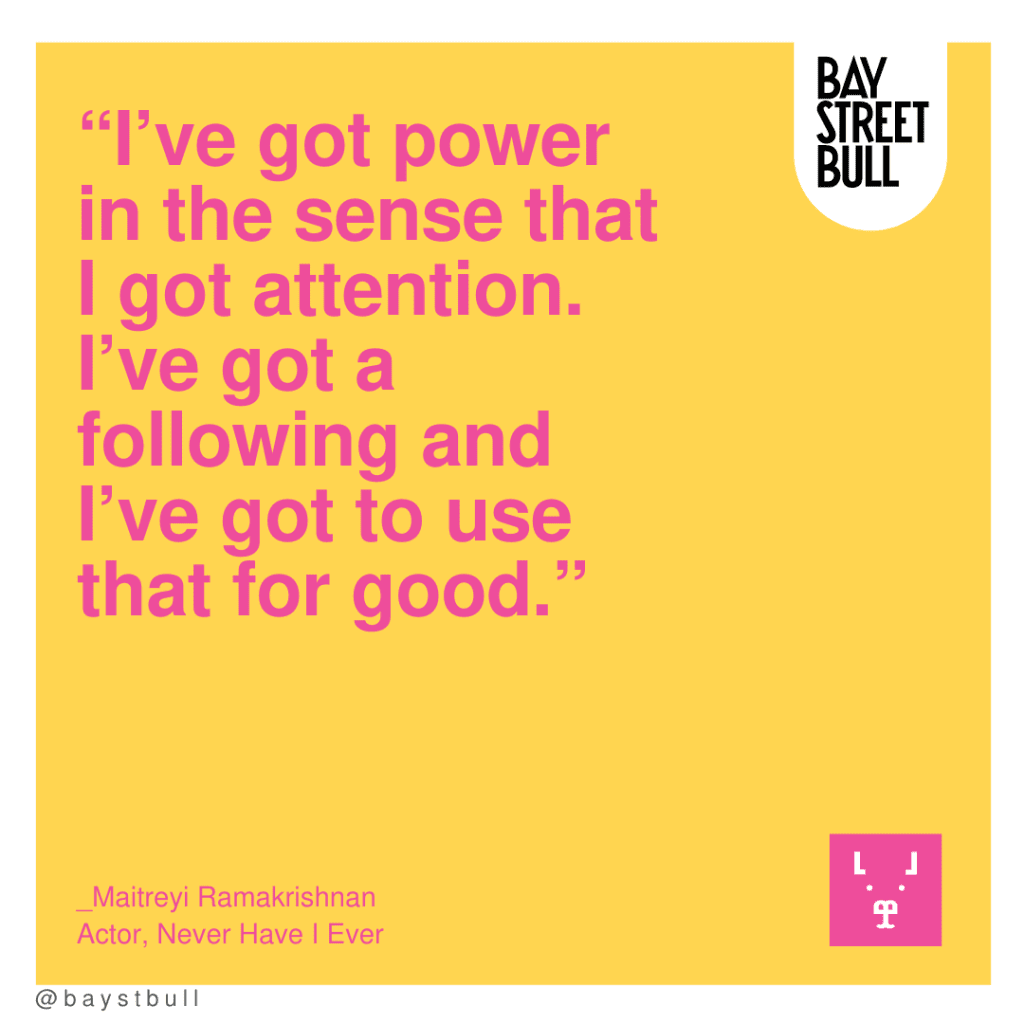

Maitreyi Ramakrishnan: Yeah, I definitely think so because I’ve got power in the sense that I got attention. I’ve got a following and I’ve got to use that for good. That’s because I have this jump because Never Have I Ever but I don’t want it to stop at Never Have I Ever. I want to continue to play roles that will bring attention to the Tamil community. I want to play a character that maybe wasn’t written as Tamil, but because I play it, now it’s suddenly a Tamil character, and that’s awesome. It doesn’t have to be a character that totally focuses and hones in on Tamil culture, but she just happens to be Tamil and she’s maybe totally different from Devi. Like if that character and Devi walked into a room, they would have a boxing match, I don’t know. But the idea that I’m playing a bunch of new characters with different personalities representing as much as I can within the Tamil community because I’m Tamil and I’m a girl.
Lance Chung: Obviously Mindy is a pioneer in a lot of different ways. Have you had this kind of conversation with her about what it means to be playing these kinds of characters, what it means to be putting out this kind of show. Have you had any dialogue around the responsibility of your work?
Maitreyi Ramakrishnan: Yeah, we’ve had our conversations about how, you know, there is a responsibility because there’s such a small group of representation for South Asians, right. And then even smaller for Tamil people, specifically in Hollywood. But having that sense of responsibility to always do the best that you can and putting the best foot forward, and trying our best not to misrepresent, we’ve definitely had that conversation. I remember one time she was applauding me saying like, Oh my God, I’m so proud of you. I can’t believe you’re doing this at such a young age. I could never do this. And then I’m like, You did this when it was like years ago when it was way harder to do this. Okay. So, you’re awesome. You’re like the OG pioneer here. I’m on your shoulders and just as much as I’m on Mindy’s shoulders, I’m truly on the shoulders of all South Asian actors that are in Hollywood right now, between Poorna [Jagannathan] and Richa [Moorjanias] as well because of their contributions to Hollywood, I’m able to be where I am.
Lance Chung: Moving forward, what would progress mean to you? What does it look like to you? How do you define it?
Maitreyi Ramakrishnan: I think progress, like a good moment of progress would be when a question lik, As a South Asian woman, those kinds of questions that are important now because we need the voice, but when questions like that don’t need to happen because it’s just normal. You know, we don’t have to have a checklist when we’re watching a show being like, Oh, and there’s the black guy. Yep. Okay. We got the one black guy. Great. Oh, there’s the East Asian awesome. It’s just natural diversity and it’s realistic and authentic
[INTERLUDE]
Lately, it seems like wherever you look, there’s a Canadian that’s leading the way, whether that’s in music and film or business and tech. In Maitreyi’s view, that can be attributed to the diversity of people in our country, which means more stories to tell and a wider audience that can see themselves represented in popular culture.
We’re living in a moment right now where Canadians no longer have to leave our borders in order to find success—a time where talent can be discovered and harnessed without moving to Silicon Valley or Hollywood. You don’t even have to live in an urban capital. Talent can be found anywhere, and Maitreyi is the perfect example of this.
Lance Chung: Now what’s been really incredible to see in the past few years, is this really wonderful wave of Canadian talent making it internationally and being respected for their work. You have everyone from Dan Levy and Schitt’s Creek to Drake, Jessie Reyez, Shawn Mendes— you know, people across all of these artistic industries. What do you think it is about Canadian talent, if there is anything specific, that is resonating so well outside of our borders,
Maitreyi Ramakrishnan: I think because Canada is quite diverse and I’m speaking in terms of growing up in Mississauga, near Toronto and all that, because I haven’t been all over Canada so not trying to generalize, but I think because we’re so diverse, we have a lot of stories to tell because we also hear a lot of stories. I think maybe there’s a sense of being the underdog because we’re in the shadow of America in terms of Hollywood, that we feel the need to just be like, we can equally do this and we’re killing it. It’s awesome to see all the Canadian talent. I always say on set, every good cast has at least one Canadian. So, you’re welcome. No big deal. You can thank me later. That is totally true and it is a scientific fact. But it’s awesome to see Canadian talent on the rise because it also just shows that you don’t need to be in America to make it big. And even in terms of Canada, you don’t need to be in Toronto downtown to make it. I’m just from Mississauga and I made my tape in a community center, and sure it’s a very unique experience and a very unique circumstance, but talent truly can come from anywhere. Canada, America, beyond.
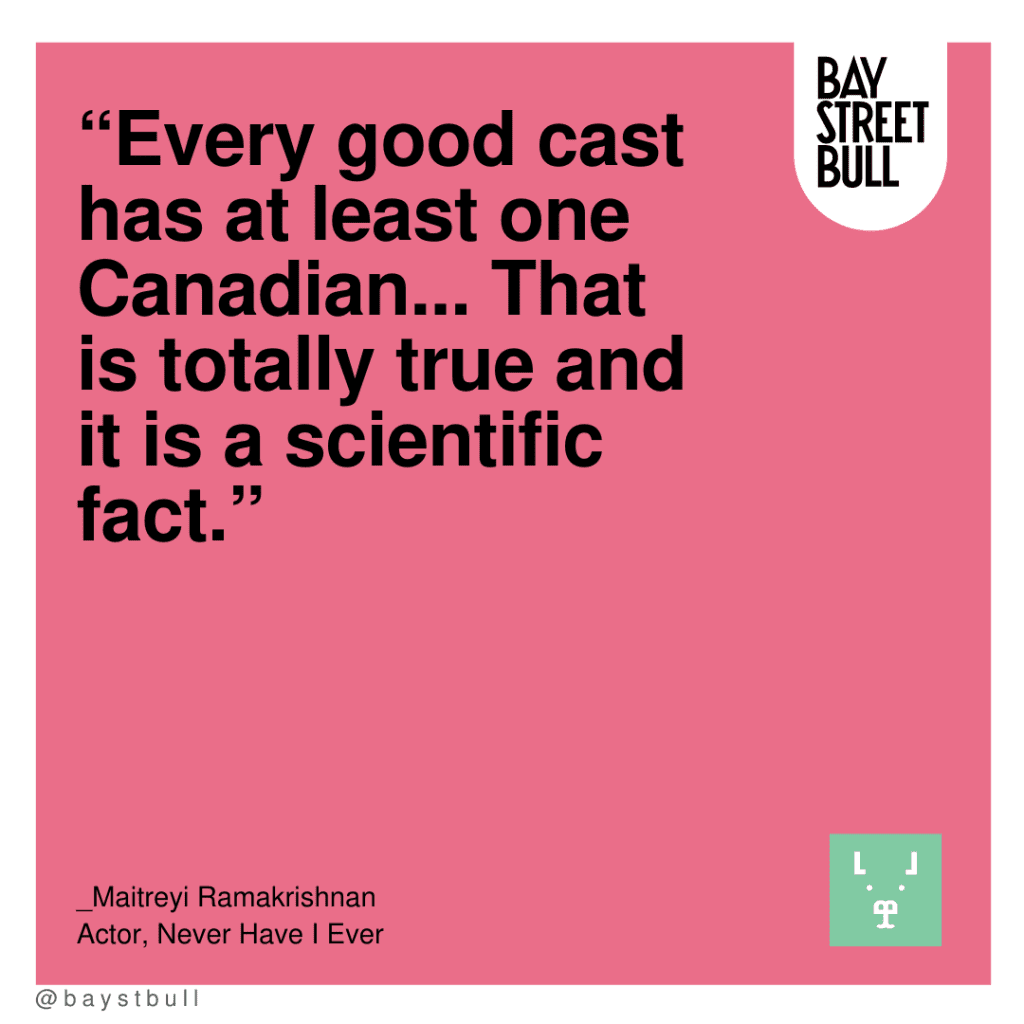

As an actor and ultimately an ambassador for your community, what would you say is your mission at the end of the day? Do you have a larger sense of purpose that you’d like to portray through your work and the roles that you take on in the future?
Maitreyi Ramakrishnan: That’s a big question because I feel like one day I’ll wake up and I’ll say my mission is to just get out of bed. One day, it’ll be, let me go get an Oscar. I think the real mission, all I really want to do, is just to keep acting, keep taking up space within Hollywood, and take on strong roles. I want to be able to portray so many strong female characters and that would be amazing. Truly acting is what I miss the most in quarantine. As much as I love the idea of going on a red carpet and even having a premiere party for Never Have I Ever I’d really just like to get back to filming. That’s the real fun part, but with Never Have I Ever I’ll always think, I was the best, sure, out of like a huge number of 15,000 to play this role of a South Asian girl, but now I want to be just the best girl, the best person, who cares. I just want to be the best person for the role and that truly nobody else could play this character but me.
[OUTRO]
It’s hard to remember that Maitreyi is only eighteen years old, and that this role is her first big gig. Speaking to her illuminates a strong sense of identity that is layered, complex, and curious, just like her character Devi. In our cultural dialogue right now, we’re having hard but important conversations around equity and representation. What is exciting, as a result of these conversations, is the opportunity for talent like Maitreyi to finally own a piece of the stage. A young South Asian woman leading a show like Never Have I Ever is groundbreaking and hopefully a sign of a future we can all look forward to.


